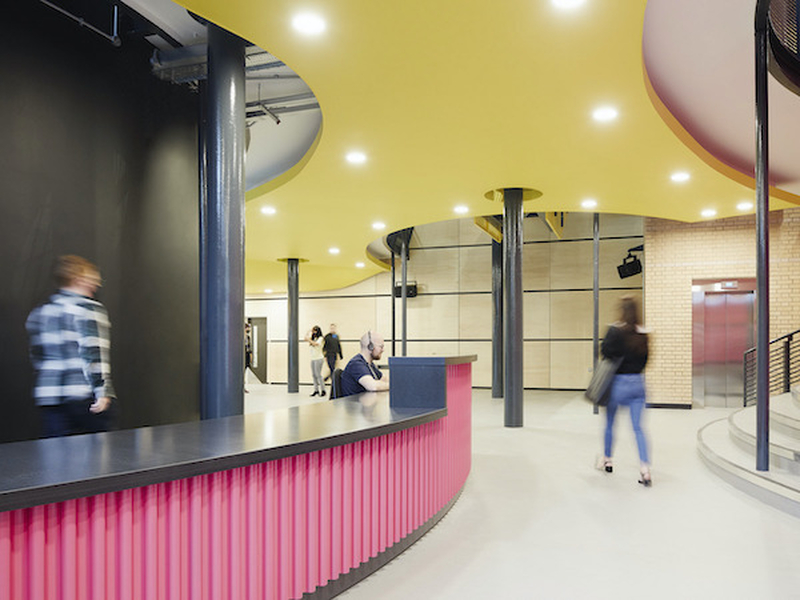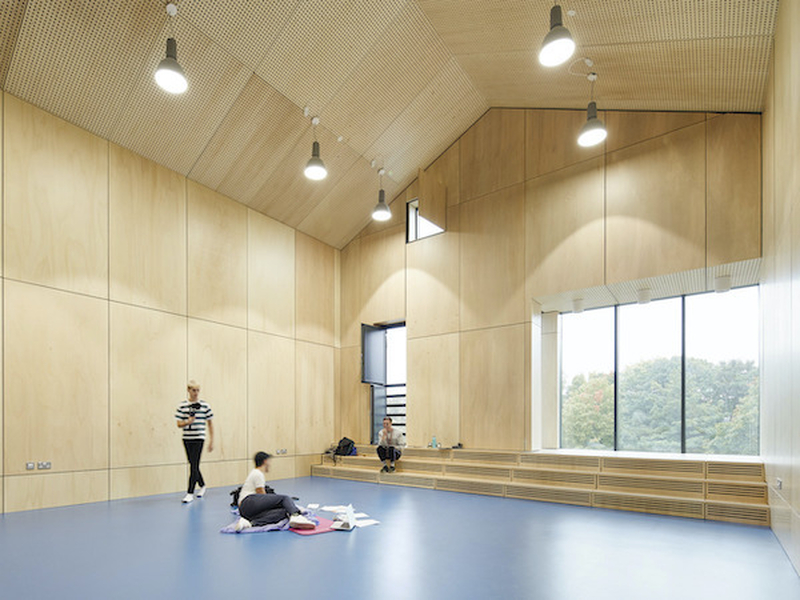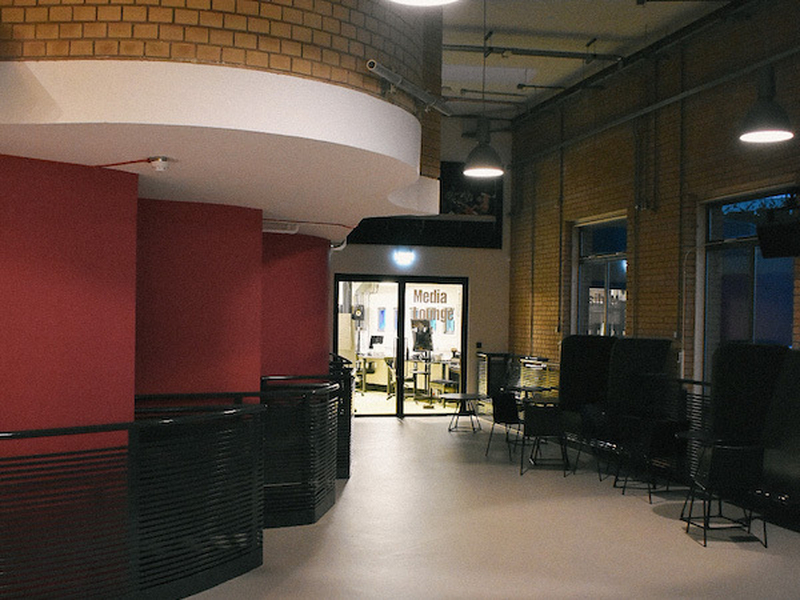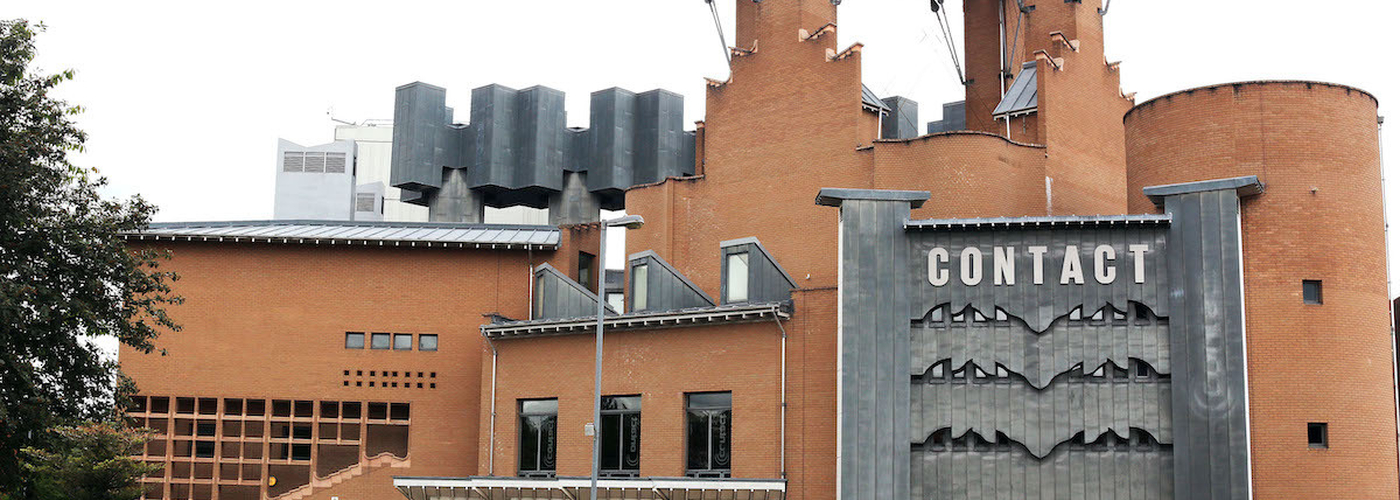Artistic Director and Head Of Creative Development reflect ahead of handing reins to next generation
It’s the end of an era at Contact Theatre as Artistic Director Matt Fenton and Head of Creative Development Suzie Henderson have announced they will step down from their roles in early 2022. Both say the time is right to hand over leadership to the next generation.
Matt, who is also Contact’s Chief Executive, leaves after eight years in the role whilst Suzie leaves after fifteen. Both have overseen dramatic change at the theatre, notably the £6.75m rebuild and the challenges of a global pandemic, with Contact reopening in September this year after a nearly four year hiatus.
It just feels like the right time. I’d been thinking for quite a long time once the building was fully open we would hand it on.
The transformation saw the iconic Oxford Road institution completely revamped with new performance spaces, recording studios, office spaces for young creatives and a unique health and science space.
The youth-led theatre reopened this year with an emotional four night run of Everything All Of The Time, a Contact Youth Company production directed by Matt and choreographed by Yandass Ndlovu.

The right time to hand over to a new generation
“It’s a very strange feeling,” Matt says, speaking to Manchester Confidential on the day of the announcement.
“In many ways I’m completely committed to Contact, I think it’s brilliant, I’m not leaving because I’ve had enough. It just feels like the right time. I’d been thinking for quite a long time once the building was fully open we would hand it on.”
Restrictions since reopening have led to a mixture of socially-distanced shows and busier events at Contact, the latter recreating the buzz of the pre-pandemic theatre. Matt likened the reopening shows to a release valve of emotion.
“Myself and Yandass didn’t want to make a show about the pandemic but at the same time, you couldn’t pretend it wasn’t a thing. On the opening nights we held the moment at the end where the cast line up for a lot longer and on the last night, the cast started crying as well as the audience, there was just this feedback loop of emotion.”

A ground-breaking model of governance, leadership and engagement
When recalling their first impressions of Contact Theatre, both Matt and Suzie point to the unique power, governance and diversity of the institution. Matt remembers going to watch shows, under the watch of then artistic director John McGrath, and being caught by the diversity of the audience even then. He’s proud to highlight fifty percent of the current board of trustees are under 30. A percentage that would be unusual elsewhere.
Both remember their respective interviews as indicators of how revolutionary the processes were and remain to this day. Anyone applying for a job, from top to bottom, is required to partake in a staff interview panel as well as a young person’s interview panel and both are given equal weight with both having to agree on a candidate.
Unlike other artistic directors in similar positions, Matt’s role over the past eight years has been to shape not dictate. The theatre’s programme, rather than being informed by his own personal preferences and identity, is the result of the theatre’s Re:Con young programming team who are present at all planning meetings as well as the staff’s personal interests across the creative disciplines, be it spoken word or dance.
“That's why the programme has this authentic connection with young and diverse audiences. There's young diverse people feeding into it.” Matt says. He cites a 2015 article in The International Journal of Arts Management that used Contact as a case study. The article’s conclusion asked a simple question: why are other institutions not copying this model?

Highlights, experiences and expressions of identity
Certain highlights stick out from Matt and Suzie’s time at Contact. Suzie points to Contacting the World as an especially profound moment in her career.
Founded in 2002 in the wake of The Commonwealth Games, the international youth festival brings together six young theatre companies from Europe and six from the rest of the world for a week of paired shows, workshops and cultural exchange. Suzie was involved in the 2008 edition which was held in Liverpool as part of the European City of Culture programme.
“We took a young man at the time called Chunky, who is now really big on the music scene, he’s an MC who’s worked with The Mouse Outfit and done a lot of other music collaborations. He was on the periphery, he hadn’t decided to get involved, and we got him to volunteer with us in Liverpool.” Suzie says.
“His family are from Zimbabwe and he hadn’t been able to go back since he’d come to the UK. There was a company from Zambia, which borders Zimbabwe, at the festival called Bare Feet and I just remember a conversation with him at the bar on the evening and he was in tears, talking about how much it had impacted him to be able to see people he saw himself reflected in and spend time with them.”

Suzie also points to the impact of shows she’s worked on, notably I Told My Mum I Was Going On An RE Trip, a collaboration with Liverpool’s 20 Stories High theatre company. The verbatim production was made with young women from Manchester, Liverpool and Northern Ireland that had experienced unplanned pregnancy, capturing their experiences.
The production soon went on to tour nationally before being picked up by the BBC and made into a piece of television. It was broadcast on BBC2 as well as featuring on iPlayer, where it was viewed over half a million times.
“Young women and young men really wanted an opportunity to have these conversations. To have them now in a safe space, when they weren’t in a position where they needed to make a time-sensitive decision about what they might do if they found themselves in that position. Which is so often the case.” Suzie says.
The nurturing of talent is also a point of pride for Matt and Suzie. Keisha Thompson, Afreena Islam and the now BAFTA-winning Sophie Willan are just some of the exciting names to have been a part of Contact under their stewardship.
“Being part of Sophie’s journey has been incredible, not just individually but for all of the young people we work with. Alma’s Not Normal is brilliant and for that to have been commissioned and the awards and nominations, she fully deserves it. She’s one of the hardest working people I’ve ever known and that’s because she’s had to be. It’s brilliant that young people love knowing she came through Contact. That’s a story they can relate to.” Suzie says.

Challenges and the politics of austerity
Needless to say, Matt and Suzie’s time has not been plain sailing. Even away from the challenges of the pandemic and a major capital project, their respective roles and the theatre as a whole have had to deal with the impacts of political decisions beyond their control.
“One of the toughest things that has the biggest impact on Contact and the work we do has been the cuts to social care services and mental health services for young people.” Suzie says.
“When I first started, there was a brilliant and thriving youth sector. There were detached youth workers working in all the different parts of Manchester, the waiting lists for young people that were suffering from mental health issues were manageable. During all the years of austerity and the current Tory government, those things have just been absolutely decimated. As an organisation working directly with young people, and young people with complex needs and backgrounds, that is felt by all the staff and the artists that do that work.”
All of the staff at Contact have had to adapt to these circumstances, including Matt and Suzie and both feel like these conditions have made the work of their organisation more important than ever. Training such as Mental Health First Aid has been crucial and providing similar support and training to staff has been an essential part of everyday life at the theatre.
The more the two speak of the difficult political climate and the challenges faced by creative organisations like Contact, the more crucial the institution feels.
“The only thing to add is that there's a similar reduction in provision at school over that same period and especially the eight years that I've been at Contact.” Matt says.

“The reduction of drama studies, dance and music at GCSE. The reduced uptake in those subjects at higher education and further education. The reduction of free school music and drama provision as an after-school activity, which is obviously particularly important for families that can’t afford the commercial versions of those things.”
Contact provides a space for young people to experience those dwindling opportunities for free. Likewise, it provides the space and opportunity for a slightly immeasurable but nonetheless innately human need: to express oneself and what is going on in your life. Something as Matt points out, “is harder to express in a maths or chemistry lesson.”
“Those creative subjects are also a space for kids who have been written off in other subjects and they suddenly thrive. It turns out they’re a great musician or they can rap brilliantly and suddenly that person and that whole class see themselves differently.”
Matt points to the government’s view of school subjects through a solely economic lens and the insistence of STEM at the expense of others, from a young age, as a tragedy. The divide forming as said provisions become accessible only to the middle classes and private schools is also a major concern.

Futures, legacies and impacts
Despite the inevitable future challenges, thanks to Matt and Suzie’s work, the future looks bright at Contact.
“We're growing the engagement of young people in our major LGBTQ festival - Queer Contact. That will become more and more youth-curated and that begins in earnest from next February. There's quite significant growth in our music output. As part of the rebuild, the developers created a really great recording studio which can be used as a music teaching space and we’re seeing a really exciting flourishing of musicians.” Matt says.
Matt feels music will be more of significant output at Contact over the coming years. As will an innovative approach to health and the arts.

“We're developing a lot of projects that engage with health, particularly health issues that affect young people and their lives. The building now has a dedicated space to explore arts, health and wellbeing, as well as the associated science and research both with young people but also with health specialists and researchers.”
Matt also highlights the rebuild itself. The potential of the inside of the iconic castle on Oxford Road. Spaces are bigger. There’s more room. The building can support more events at once. A cabaret in one theatre, people working away in the music studio, a sold-out performance in another room as young people, some of whom may well win a BAFTA someday, rehearse upstairs.
“We've created a much bigger, potentially more positive space to accommodate a lot more people at one time. Hopefully, that's a really great legacy of what me, Suzie and the team have done."
Contact Theatre, Oxford Rd, Manchester M15 6JA
Follow Davey on Twitter and Instagram: @dbretteats













